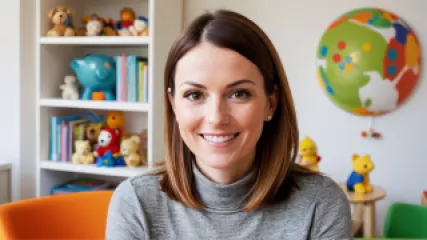Unlocking the Secrets of Positive Child Behavior: An Interview with a Child Psychologist
Unlocking the Secrets of Positive Child Behavior: An Interview with Fiona Davidson, Child Psychologist
Navigating the complexities of child behavior can be a daunting challenge for many parents and caregivers. From temper tantrums to defiant attitudes, the journey of raising well-adjusted children can be filled with unexpected twists and turns. In this insightful interview, we sit down with Fiona Davidson, a renowned child psychologist, to uncover the secrets behind positive child behavior and explore effective strategies for fostering emotional well-being in young minds.
The Roots of Positive Behavior
As we begin our conversation, Fiona Davidson emphasizes the importance of understanding the underlying factors that contribute to positive child behavior. "At the core of positive behavior lies a child's emotional and social development," she explains. "When we create an environment that supports a child's innate need for security, self-expression, and connection, we lay the foundation for their overall well-being and resilience."
According to Fiona, nurturing a child's emotional intelligence is crucial in shaping their behavior. "Emotions are the language of childhood," she says. "By helping children understand and regulate their emotions, we empower them to navigate challenging situations with greater ease and adaptability."
Strategies for Fostering Positive Behavior
When asked about practical strategies for fostering positive behavior in children, Fiona shares a wealth of insights drawn from her years of experience. "One of the most powerful tools is the cultivation of a strong parent-child relationship," she emphasizes. "When children feel heard, understood, and unconditionally loved, they are more likely to respond positively to guidance and discipline."
Fiona also highlights the importance of setting clear and consistent boundaries. "Children thrive on structure and predictability," she explains. "By establishing age-appropriate rules and consequences, we provide a sense of safety and security, which in turn, supports their development of self-regulation and responsible decision-making."
The Role of Positive Reinforcement
In Fiona's approach, positive reinforcement plays a pivotal role in shaping behavior. "Catching children being good and acknowledging their efforts is far more effective than solely focusing on correcting negative behaviors," she says. "When we validate and celebrate their positive actions, we reinforce the behaviors we want to see more of, and this approach fosters a sense of confidence and self-worth."
Fiona encourages parents and caregivers to be creative in their use of positive reinforcement, whether it's through verbal praise, sticker charts, or special privileges. "The key is to find what motivates each individual child and to apply these reinforcements consistently," she advises.
Addressing Challenging Behaviors
While the focus should be on nurturing positive behaviors, Fiona acknowledges that every child will encounter moments of difficulty. "Challenging behaviors are a natural part of a child's development," she says. "The way we respond to these behaviors can make all the difference in shaping a child's future actions."
Fiona emphasizes the importance of empathy and understanding. "When a child is struggling, it's crucial to approach the situation with compassion and to try to understand the underlying causes," she explains. "Is the child feeling overwhelmed, frustrated, or in need of attention? By addressing the root of the issue, we can help the child develop more constructive coping mechanisms."
In addition to a compassionate approach, Fiona recommends the use of logical consequences. "Consequences should be reasonable, related to the behavior, and consistently applied," she says. "This helps children understand the connection between their actions and the outcomes, fostering a sense of responsibility and accountability."
The Power of Collaboration
Fiona believes that positive child behavior is not solely the responsibility of parents and caregivers, but rather a collaborative effort involving a network of support. "It takes a village to raise a child," she says. "By partnering with teachers, counselors, and other professionals, we can create a cohesive environment that reinforces positive behaviors and addresses any underlying concerns."
She emphasizes the importance of open communication and a willingness to seek help when needed. "Parents and caregivers should never feel ashamed to reach out for support," Fiona explains. "By working together with professionals, we can develop a comprehensive plan that meets the unique needs of each child and family."
Fostering Emotional Well-Being
Throughout the interview, Fiona consistently emphasizes the crucial role of emotional well-being in shaping positive child behavior. "Children's emotional development is the foundation upon which all other aspects of their growth and behavior rest," she says. "By nurturing their ability to understand, express, and regulate their emotions, we empower them to navigate the complexities of life with greater resilience and self-awareness."
Fiona encourages parents and caregivers to actively engage in activities that promote emotional literacy, such as open-ended conversations, imaginative play, and mindfulness practices. "When children feel safe to explore and express their emotions, they develop the essential skills needed to form meaningful connections, manage stress, and make thoughtful decisions."
The Ongoing Journey of Positive Behavior
As our conversation comes to a close, Fiona emphasizes that the journey of fostering positive child behavior is an ongoing process, one that requires patience, flexibility, and a willingness to adapt to the unique needs of each child.
"Positive behavior is not a destination, but rather a continuous exploration of the child's inner world and the creation of an environment that supports their holistic well-being," she says. "By staying attuned to the ever-evolving needs of our children and embracing the challenges as opportunities for growth, we can unlock the secrets of positive behavior and help our young ones thrive."
Fiona's insights and expertise offer a profound and practical roadmap for parents, caregivers, and professionals alike, providing a deeper understanding of the complexities of child behavior and the strategies needed to cultivate a more positive and fulfilling future for our children.






